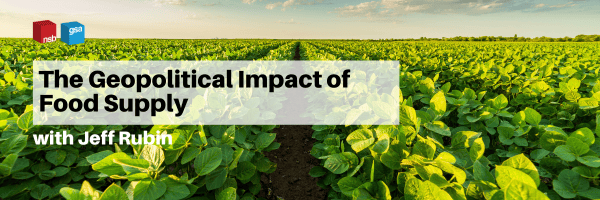The Hunger Games: The Geopolitical Impact of Food Supply with Jeff Rubin
Food has emerged as both a weapon and a detriment, reshaping global power dynamics.
An #NSBOriginal
By Jeff Rubin
Food has been used in warfare since time immoral, becoming a powerful weapon to terrorize populations. As Henry Kissinger once quipped, “Control oil and you control nations, control food and you control people.” In the context of the Russia-Ukraine conflict, both nations being major breadbaskets, it should come as no surprise that food has become both a weapon and a casualty of the war.
Russia, the world’s top grain exporter, may be leveraging its food exports to gain more geopolitical power, particularly in the developing world. While only 2.5 million people in Cairo drive a car, all 20 million of them eat, with their primary food source being imported Russian grain. This dynamic showcases the strategic importance of food in global politics.
The United Nations warns that the world is facing its worst food security problem since World War II. The supply of food and the fertilizer needed to grow it have both become precarious, with prices for both food and fertilizer soaring to record highs since the conflict in Ukraine began. Russia, with its vast natural gas reserves, just also happens to be the world’s leading fertilizer exporter, exacerbating the crisis. It is certainly no coincidence that African nations—who are critically dependent on Russian grain—have refrained from condemning Russia’s invasion of Ukraine.
Interestingly, this situation benefits Canadian farmers and fertilizer producers. Canada, the world’s second-largest grain exporter and second-leading exporter of fertilizer, is experiencing extended growing seasons due to climate change, enabling the commercial growth of corn and soybeans on the Canadian prairies for the first time.
This new world order, marked by economic conflict, suggests that wheat kings will find many hungry friends in the emerging global landscape.
– Jeff Rubin
About The Author
Jeff Rubin | Leading Economist and Global Energy & Trade Expert
Jeff Rubin previously served as the Chief Economist at CIBC World Markets and was one of the first economists to accurately predict the rising oil prices in the 2000s. Now, Jeff specializes in energy and climate change, focusing on their effects on both the Canadian and global economies.
His new book, The New Normal, released in May of this year, sheds light on the interconnectedness of global events and how they will reshape economies, politics, and daily life for years to come. An engaging speaker who doesn’t shy from controversy and offers a different opinion about the world’s economic landscape, Rubin provides insightful and compelling commentary on the impact of trade deals, a greater global equity for the rich, globalization and the digital revolution, and challenges to liberal democracy.
Interested in hosting Jeff Rubin at your next event?
[Request for Jeff’s Availability]


